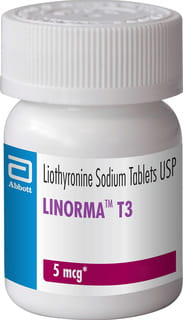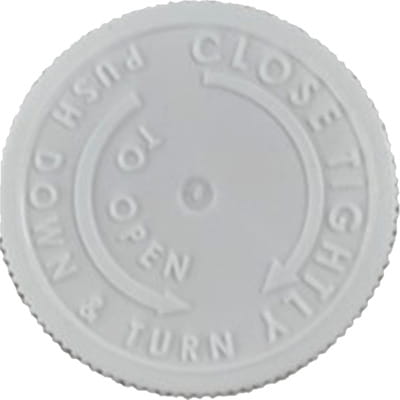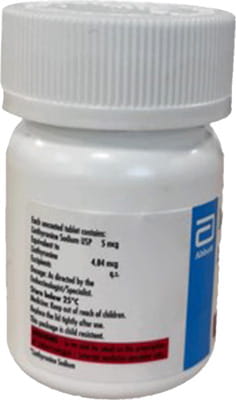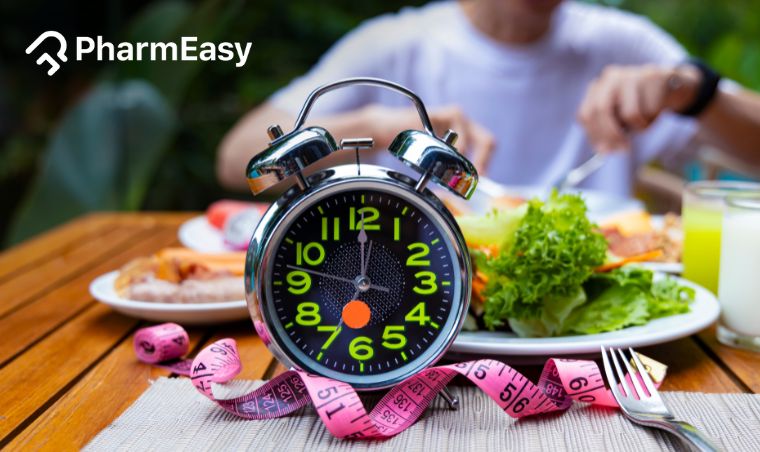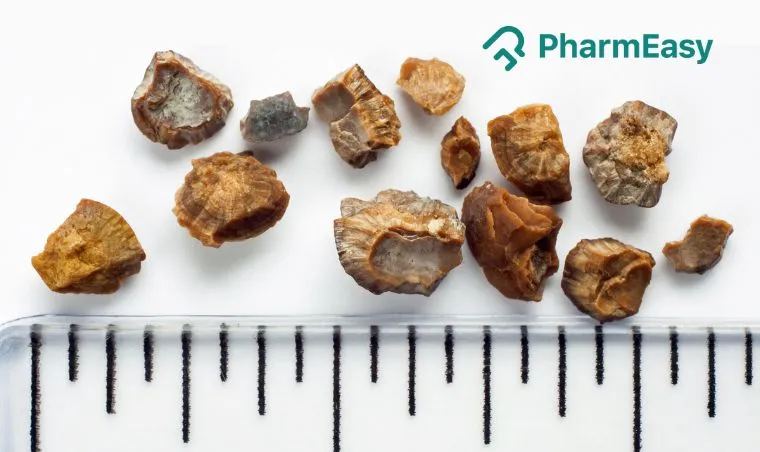Linorma T3 5mcg Bottle Of 100 Tablets
Description
Linorma T3 tablet is used to treat low thyroid hormone levels (hypothyroidism), help manage certain types of thyroid cancer, and assist in thyroid function tests. It contains liothyronine as an active ingredient. It works by replacing a natural hormone (T3) that your body normally produces to help regulate energy and metabolism. Take this medicine exactly as prescribed by your doctor, usually once daily with or after food, and at the same time each day. Swallow it whole with water.
You should not take Linorma T3 tablet if you are allergic to it or have untreated adrenal gland problems. Common side effects may include headache, nervousness, trouble sleeping, rapid heartbeat, weight loss, or diarrhoea. Let your doctor know if you experience any unusual changes, especially heart-related symptoms such as chest pain or shortness of breath.
Some medications may interfere with how Linorma T3 tablet works or increase its effects. These include cholesterol-lowering drugs, hormones, heart or diabetes medications, antidepressants, and some cancer drugs. To avoid interactions, your doctor may adjust the doses or space out the timing between medications.
Store Linorma T3 tablet in a cool, dry place, away from sunlight and moisture. If you miss a dose, take it as soon as you remember, unless it is almost time for the next one, in which case, skip it. Do not take two doses together. If you take too much, get medical help right away.
If you are pregnant or breastfeeding, talk to your doctor. Thyroid hormone needs may change during pregnancy, and it is unclear how much of this medicine passes into breast milk. This medicine may also affect blood sugar levels in people with diabetes, and long-term use in women after menopause may weaken bones, so regular check-ups are important.
Product Summary
| Offer Price | ₹1050.00 |
| You Save | ₹262.50 (20% on MRP) |
| Contains | Liothyronine(5.0 Mcg) |
| Uses | Hypothyroidism |
| Side effects | Arrhythmias, myocardial infarction, dyspnea, headache, nervousness |
| Therapy | DRUGS FOR HYPOTHYROIDISM |
Uses
- Hypothyroidism: As replacement in primary (thyroidal), secondary (pituitary), and tertiary (hypothalamic) congenital or acquired hypothyroidism.
- Pituitary Thyrotropin (Thyroid-Stimulating Hormone, TSH) Suppression: As an adjunct to surgery and radioiodine therapy in the management of well-differentiated thyroid cancer.
- Thyroid Suppression Test: As a diagnostic agent in suppression tests to differentiate suspected mild hyperthyroidism or thyroid gland autonomy.
Contraindications
- If you are allergic to liothyronine or any other ingredients of Linorma T3 tablet.
- If you have uncorrected adrenal insufficiency.
Side effects
- Arrhythmias
- Myocardial infarction
- Dyspnoea
- Headache
- Nervousness
- Irritability
- Insomnia
- Tremors
- Muscle weakness
- Increased appetite
- Weight loss
- Diarrhoea
- Heat intolerance
- Menstrual irregularities
- Skin rash
Precautions and Warnings
Pregnancy
Breast Feeding
Driving
Alcohol
Other General Warnings
- You have a heart condition or are elderly, as Linorma T3 tablet may increase your heart rate or cause chest pain or irregular heartbeat.
- You are undergoing surgery and have heart disease. Your heart rhythm needs careful monitoring while on this medication.
- You have symptoms of severe hypothyroidism (myxedema coma), such as low body temperature, confusion, or extreme tiredness. This condition requires emergency IV treatment, not oral tablets.
- You have adrenal gland problems. Starting Linorma T3 tablet without treating adrenal insufficiency can cause a life-threatening crisis.
- You experience symptoms of too much or too little thyroid hormone, such as fatigue, weight changes, mood swings, or rapid heartbeat. Your dose may need adjusting.
- You have diabetes; this medicine can make blood sugar harder to control and may require changes to your diabetes medications.
- You are a post-menopausal woman or at risk for bone loss. Excessive liothyronine intake can lead to a reduction in bone strength over time.
Directions for Use
- Linorma T3 tablet should be taken as directed by your doctor.
- Swallow it whole with a glass of water.
- It should be taken with or after a meal to reduce its side effects.
- It is best to take it at a fixed time for optimal results, and you should not consume it more than prescribed by your doctor.
Storage and disposal
- Store between 15°C and 30°C
- Store Linorma T3 tablet in a cool, dry place, protected from direct sunlight, moisture, and heat.
- Keep it out of the reach of children and pets.
Dosage
Overdose
Missed a Dose
Mode of Action
How Does It Work?
Interactions
Interactions with other medicines
- Take Linorma T3 tablet at least four hours apart from medications that can bind it in your stomach, such as cholestyramine, colestipol, colesevelam, Kayexalate, or sevelamer, to ensure proper absorption....
- Certain hormones and drugs, such as estrogen pills, tamoxifen, steroids, or anticonvulsants, can change the levels of proteins that carry thyroid hormones in your blood, but this usually does not affect how you feel. Your doctor will check your lab tests regularly....
- Some medications, like phenobarbital or rifampin, may make your liver break down liothyronine faster, so your doctor may adjust your dose if you are taking them.
- Large doses of beta-blockers (e.g., propranolol), steroids (like dexamethasone), or heart medications (e.g., amiodarone) may reduce the conversion of T4 to T3 or interfere with liothyronine’s action. Your thyroid levels will need close monitoring....
- If you take blood thinners (such as warfarin), Linorma T3 tablet can increase their effect, so your doctor may reduce your dose and monitor your blood clotting tests more frequently.
- Linorma T3 tablet may also affect medicines for heart conditions, such as digoxin, requiring adjustments in dosage.
- Antidepressants (like amitriptyline or sertraline) used with liothyronine may increase sensitivity to their effects; your doctor may need to adjust both doses.
- When used with pain/numbing drugs like ketamine or stimulants (e.g., adrenaline, decongestants), liothyronine may raise blood pressure or heart rate. Patients with heart disease should be monitored carefully....
- Certain cancer drugs (like imatinib) may cause low thyroid levels, so thyroid function tests should be checked regularly if these medications are used.
- Tests for thyroid hormones can be affected by changes in the levels of thyroid hormone-binding proteins. If you take estrogens, steroids, or have liver or kidney conditions, your doctor may order “free T4 or T3” tests for accurate monitoring....
Content Details
Ravindra Ghongade
B. Pharm
Dr. Nikita Toshi
BDS (Bachelor of Dental Surgery), WHO FIDES member
Frequently Asked Questions (FAQs)
Q: Can Linorma T3 tablet help with weight loss?
Q: Is Liothyronine the same as levothyroxine (T4)?
References
- U.S. Food and Drug Administration. Triiodothyronine (Cytomel) [package insert] [Internet]. Revised March 2018 [cited 2025 Jun 25].
- Central Drugs Standard Control Organisation. Drugs. [Internet]. New Delhi: Directorate General of Health Services, Ministry of Health & Family Welfare, Government of India; [cited 2025 Jun 25].
Did you find this medicine information helpful?
Please rate your experience
